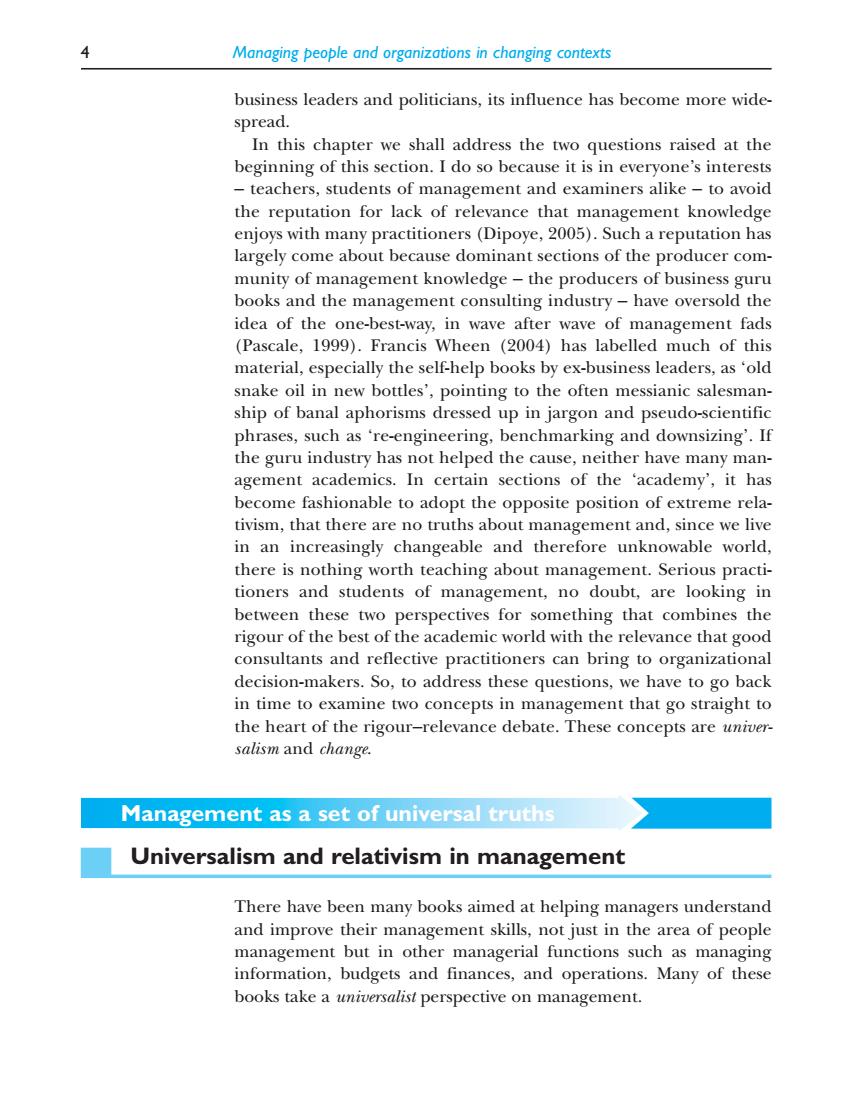正在加载图片...

Managing people and organizations in changing contexts business leaders and politicians,its influence has become more wide spread. In this chapter we shall address the two questions raised at the beginning of this section.I do so because it is in everyone's interests teachers,students of management and examiners alike-to avoid the reputation for lack of relevance that management knowledge enjoys with many practitioners(Dipoye,2005).Such a reputation ha largely come about because dominant sections of the producer com- munity of management knowledge-the producers of business guru books and the management consulting industry-have oversold th idea of the one-best-way,in wave after wave of management fads (Pascale,1999).Francis Wheen (2004)has labelled much of this material,especially the self-help books by ex-business leaders,as'old snake oil in new bottles'.pointing to the often messianic salesman- ship of banal aphorisms dressed up in jargon and pseudo-scientific phrases,such as 're-engineering,benchmarking and downsizing'.If the guru industry has not helped the cause,neither have many man- agement academics.In certain sections of the 'academy',it has become fashionable to adopt the opposite position of extreme rela- tivism,that there are no truths about management and,since we live in an increasingly changeable and therefore unknowable world there is nothing worth teaching about management.Serious practi- tioners and students of management,no doubt,are looking in between these two perspectives for something that combines the rigour of the best of the academic world with the relevance that good consultants and reflective practitioners can bring to organizational decision-makers.So,to address these questions,we have to go back in time to examine two concepts in management that go straight to the heart of the rigour-relevance debate.These concepts are univer salism and change. Management as a set of universal truths Universalism and relativism in management There have been many books aimed at helping managers understand and improve their management skills,not just in the area of people management but in other managerial functions such as managing information,budgets and finances,and operations.Many of thes books take a universalist perspective on management. business leaders and politicians, its influence has become more widespread. In this chapter we shall address the two questions raised at the beginning of this section. I do so because it is in everyone’s interests – teachers, students of management and examiners alike – to avoid the reputation for lack of relevance that management knowledge enjoys with many practitioners (Dipoye, 2005). Such a reputation has largely come about because dominant sections of the producer community of management knowledge – the producers of business guru books and the management consulting industry – have oversold the idea of the one-best-way, in wave after wave of management fads (Pascale, 1999). Francis Wheen (2004) has labelled much of this material, especially the self-help books by ex-business leaders, as ‘old snake oil in new bottles’, pointing to the often messianic salesmanship of banal aphorisms dressed up in jargon and pseudo-scientific phrases, such as ‘re-engineering, benchmarking and downsizing’. If the guru industry has not helped the cause, neither have many management academics. In certain sections of the ‘academy’, it has become fashionable to adopt the opposite position of extreme relativism, that there are no truths about management and, since we live in an increasingly changeable and therefore unknowable world, there is nothing worth teaching about management. Serious practitioners and students of management, no doubt, are looking in between these two perspectives for something that combines the rigour of the best of the academic world with the relevance that good consultants and reflective practitioners can bring to organizational decision-makers. So, to address these questions, we have to go back in time to examine two concepts in management that go straight to the heart of the rigour–relevance debate. These concepts are universalism and change. Management as a set of universal truths Universalism and relativism in management There have been many books aimed at helping managers understand and improve their management skills, not just in the area of people management but in other managerial functions such as managing information, budgets and finances, and operations. Many of these books take a universalist perspective on management. 4 Managing people and organizations in changing contexts